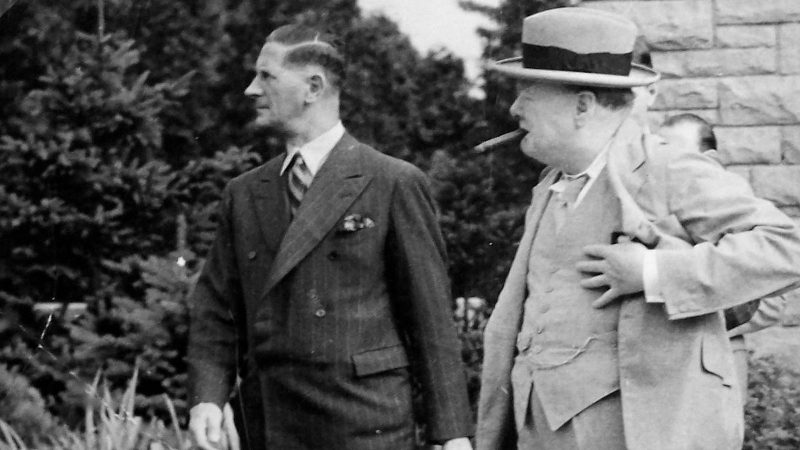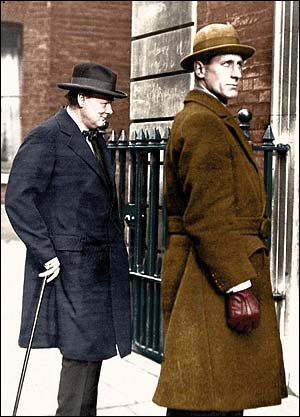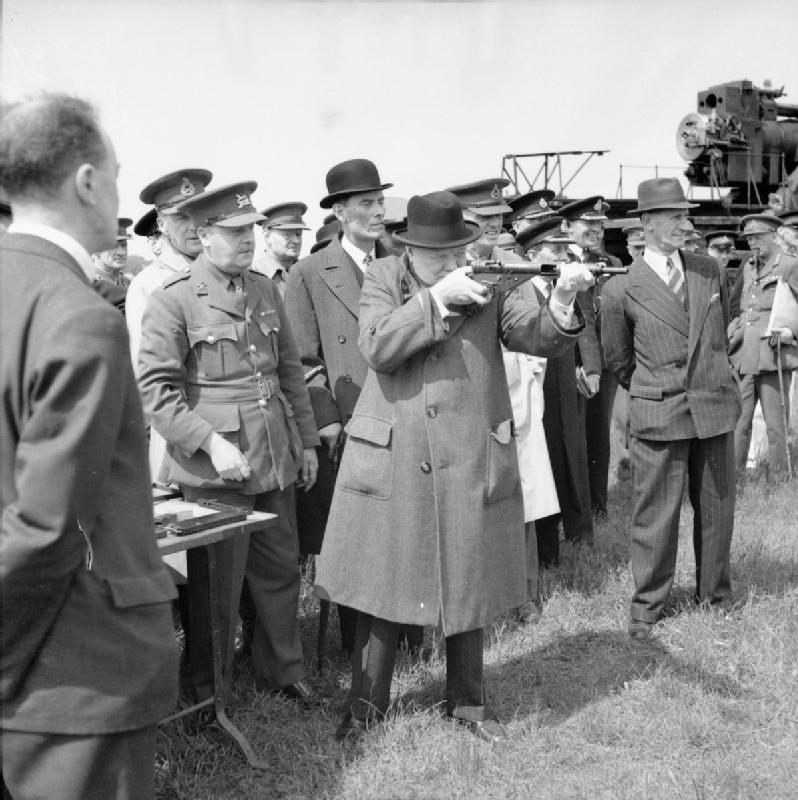
Looking at photographs of Churchill in the war years, the eye is irresistibly drawn to the thin man in the corner – the inevitable Thompson. Throughout the Second World War, and during Churchill’s Cabinet career in the Twenties, the taciturn East Ender never left his side.
Walter H. Thomson travelled over 200,000 miles while protecting Winston Churchill and was said to have spent more time with him than Churchill’s own wife. Thompson didn’t always work in the security services, he was originally a policeman who moved his way into Special Branch, where he became an expert in terrorism threats, which positioned him perfectly to look after Westminster’s security. On top of the constant threat of assassination at the hands of the Nazis, Indian Nationalists and Communists, Churchill also had a habit of voluntarily putting himself in dangerous situation such as IRA attacks, blitz bombing sites and most famously the Siege of Sidney Street, where a bullet allegedly rocketed through his top hat, inches away from his head. Thompson was said to have single-handedly saved Mr Churchill’s life on nearly 20 separate occasions and it will come as little surprise that after over 14 years of protecting Britain’s most famous minister he eventually had a nervous breakdown.
Walter Henry Thompson BEM was a British police officer who is best known as the bodyguard of Winston Churchill for eighteen years, between 1921 and 1935, and between 1939 and 1945 during World War II. Thompson reportedly saved Churchill’s life on numerous occasions. When he finally retired after the war, he published a memoir that made him famous in the UK and in the US. Scroll down for video
Thompson grew up in the working-class neighborhood of Brixton, South London. One of a family of thirteen children, he worked a number of jobs before becoming a police officer. He initially operated out of the Paddington Green police station. When the suffragette movement exploded, the police expanded the Special Branch. Thompson took the admission test and passed, later becoming part of the huge surveillance effort, by Special Branch, of the suffragette movement, during which he got to know most of the women’s rights leaders. He eventually moved on to tracking anarchists and other foreign threats before he moved to the protection detail. Thompson was initially assigned to Churchill in 1921 and worked with him until his retirement in 1935.

During his time with Churchill, Thompson traveled over 200,000 miles and is reported to have saved Churchill’s life on some 20 occasions, including times when Churchill’s own foolhardiness exposed him to danger from shrapnel during the Blitz, plots by the IRA, Indian nationalists, Arab nationalists, Nazi agents, Greek Communists and the deranged. The stress of his duties during his time with Churchill caused Thompson to suffer a breakdown, which took him away from Churchill, but within weeks, Thompson had recuperated and returned to his duties. Thompson was so liked by Churchill that when Thompson’s daughter fell ill, Churchill arranged for her to be attended to by his own doctor and insisted that the invoice be sent to him for remittance. The stress of the job, compounded by long absences away from his family, led to the dissolution of Thompson’s first marriage in 1929; during long hours waiting around whilst Churchill was in meetings, he grew close to and eventually married Churchill’s junior secretary, Mary Shearburn.
While working at a grocer’s he had bought with his family, on 22 August 1939 he received an infamous telegram that called him back into service as Churchill’s bodyguard. The telegram from Churchill read “Meet me Croydon Airport 4.30pm Wednesday.” Although at that time Churchill had no official position in government, as the leading anti-appeaserhe was aware of the prevailing risk to his life from assassins (particularly the Nazis) and engaged Thompson to protect him in the pay of £5 per week (£277 in 2016).On the same day, Thompson resumed his official duties with Scotland Yard, when Churchill rejoined the Cabinet on the outbreak of war.
He was with Churchill so much that he was a “perpetual annoyance” to Churchill’s wife, Clementine. For his service in protection of Churchill and to his country, Thompson was awarded the British Empire Medal in 1945.

In June 1945, with Churchill out of office and Thompson about to retire for a second time from the Metropolitan Police, the Commissioner of the Metropolitan Police and Downing Street decided that it would be improper for him to publish his memoirs for the foreseeable future and threatened Thompson with the loss of his police pension if it was published, even though he had nearly completed a 350,000-word manuscript. An expurgated version, I was Churchill’s Shadow was published in the 1950s.
In his memoirs, Thompson reveals himself to be a very straight, moral man, devoted to protecting Churchill. Sometimes he was the only security Churchill took with him on his many trips, much to the astonishment of the Americans in particular, who always had at least twenty minders round President Roosevelt at any one time!
He was also fiercely loyal to keeping quiet about the vast amount of top-secret information he would have been witness to, just because of the nature of his job. “The one thing about Thompson” says Nugus, “is that he doesn’t give secrets away. If Churchill had sworn him to secrecy on something there is no way he would have confided that information to anyone, including his family.”
Indeed, so devoted was Thompson to protecting Churchill that the long, antisocial hours led to the collapse of his own marriage, not to mention the irritation of Churchill’s wife. “Mrs Churchill was a bit jealous of Walter, but Walter never ever lost respect for her at any point.”
“By the nature of the job Walter spent more time with Churchill during World War Two than any other human being, but it had to be done; when the Churchills were abroad he had to sleep in the room between them, with one eye open and a gun beneath the pillow ”
So aside from the detailed accounts of how he closely guarded Churchill’s movements, what particular insights into Churchill’s personality does the series reveal? For Nugus, it is his humanity and kindness that stand out. One particular incident involves Churchill, who at the time was virtually penniless, paying to have his Harley Street doctor operate on one of Thompson’s sick children and in doing so saving her hearing. Aside from the compassion, Nugus is quick to point out that this series is unique in that it reveals Churchill’s moments of self doubt and frank honesty in times of trouble:
“You see the honesty when he and Walter are leaving the Palace after the King has asked him to form a government in preparation for war. Churchill turns to Walter and says ‘it’s an enormous task we have before us and let’s hope I’m up to the job and that we’re not too late’ Here is the great man revealing candidly to his bodyguard what his insecurities and doubts are”.
This kind of emotive response by Churchill may have contributed to the reason for Thompson’s memoirs being censored for many years. He had intended to publish his complete writings back in 1945 after the Second World War was over, but he was forced to bring out a watered-down version called I Was Churchill’s Shadow in the early fifties, which is according to Nugus, really nothing more than a travel journal. Is it possible that showing the fallible, and sometimes insecure side to Churchill’s personality straight after the War would have undermined the man’s reputation as an iron-willed leader?
Nugus sees it differently. “I think it would have caused a lot of people to ask questions about how Churchill knew the things he did during wartime that would have ultimately given away the truth about the Allies deciphering the Enigma Code.”
“If that book had been published in 1945 it could have severely compromised certain knowledge that the authorities wanted to keep secret.” It seems then that no matter how trustworthy Churchill thought Walter Thompson was, the establishment didn’t want Walter or other public servants to speak out prematurely about what they had seen.
After his book was published he became quite famous and embarked on a book tour across the UK. When the American version of his book was released in America he did over 400 lectures with his wife and made a number of TV appearances on shows like To Tell the Truth, an American TV game show where he beat the panel and won $300 (US$ 2,650 in 2016).
Thompson died of cancer on 18 January 1978, aged 87 years. After Thompson’s death, his great-niece Linda Stoker discovered the full memoir manuscript
